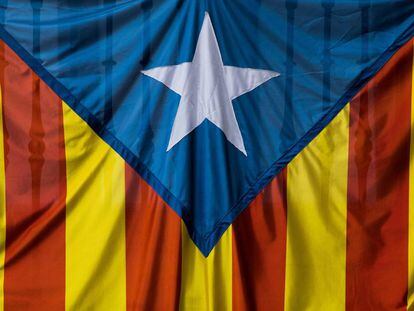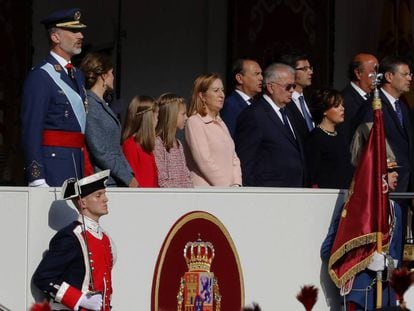In Francoland
Both Europe and the US love what they see as Spain’s quaint backwardness so much that they feel insulted when we explain to them how much we have changed

It happened to me on the last night of September in Heidelberg, but it has also happened quite frequently in other cities in Europe and the United States, and even here in Spain, when talking with foreign journalists. At various points throughout different eras, I have been forced to explain patiently, and with as much clarity as possible for educational purposes, that my country is a democracy, while undoubtedly flawed it is not any more seriously flawed when compared to similar countries. I have gone to great lengths to name dates, mention laws and changes, and establish useful comparisons. In New York, I had to remind people, who were full of democratic ideals and condescension, of the fact that my country, unlike theirs, does not accept the death penalty, sending minors to prison to serve life sentences, or torturing inmates in secret jails.
No citizen from another democratic country in Europe has ever been forced to clarify that they live in a democracy
Sometimes outside Spain, one is forced to teach a history or geography lesson. Until not too long ago, a Spanish citizen had to explain that the Basque Country is not even remotely like Kurdistan, Palestine, or the Nicaraguan jungle where Sandinistas used to protest Somoza the dictator, all in spite of being aware that the odds were that he wouldn’t be listened to. We had to explain that the Basque Country is among the most advanced territories in Europe, with one of the highest standards of living, and that it has a degree of self-government and fiscal sovereignty considerably higher than any state or federal region in the world. The answer used to be, at best, a polite but skeptical smile.
A great deal of educated opinions, both in Europe and the United States, and even more so among the academic and journalistic elites, would rather hold a bleak view of Spain, maintain a lazy attachment to the worst stereotypes, particularly about the legacy of the dictatorship, as well as a bullfight-like propensity to civil war and bloodshed. The cliché is so captivating that is unapologetically held by people who are convinced they really love our country. They want us to be bullfighters, heroic guerrillas, inquisitors, and victims. They love us so much that they hate it when we question the willful blindness upon which they build their love. They love the idea of a rebellious, fascism-fighting Spain so much that they are not ready to accept that fascism ended many years ago. They love what they see as our quaint backwardness so much that they feel insulted if we explain to them how much we have changed in the last 40 years: we don’t attend Mass, women have an active presence in every social sphere, same-sex marriage was accepted with astonishing speed and ease, and we have integrated several million immigrants in just a few years, without outbursts of xenophobia.
They love the idea of a rebel, Fascism-fighting Spain so much that they are not ready to accept that fascism ended many years ago
The other night in Heidelberg on the eve of the notorious October 1, in the middle of a pleasant dinner with several professors and translators, I had to explain that once again with a forcefulness that helped me overcome my despondency. A German female professor told me that someone from Catalonia had assured her that Spain was still “Francoland.” I asked her, as nicely as I could, how she would feel if someone said to her that Germany was still Hitlerland. She felt immediately insulted. With as much calm as I could manage and in an educational tone, I clarified what no citizen from another democratic country in Europe has ever been forced to clarify: that Spain is a democracy, as worthy and as flawed as Germany and as far away from totalitarianism; even more so, if we look at the latest election results achieved by the far right. If we are still in Francoland, as her Catalan informer said, how is it possible for Catalonia to have its own educational system, parliament, police force, public television and public radio, and an international institute for the dissemination of Catalan language and culture? Acknowledging the singularity of Catalonia was a priority for the new Spanish democracy, I told her that the Generalitat, the Catalan regional government, was re-established even before voting on the Constitution. What an odd Francoist country, one that suppress Catalan language and culture so much that it chooses a Catalan language film to represent Spain at the Oscars.
Anybody that has lived or is living outside our country knows about the precariousness of our international presence, the financial strangulation and the political meddling that have so often thwarted the relevance of the Cervantes Institute, the lack of an ambitious, long-term foreign policy, and a national framework agreement that doesn’t change with every change in government. Spanish democracy hasn’t been able to dispel age-old stereotypes. Basque terrorists and their propagandists took good advantage of that for many years, precisely the years when we were at our most vulnerable, when the most murderous gunmen were still being granted asylum in France.
Catalan secessionists have not needed a sophisticated media campaign to turn international opinion in their favor
Therefore, the Catalan secessionists have not needed much effort or a sophisticated media campaign to turn international opinion in their favor, the so-called “narrative.” They had succeeded even without the dedicated cooperation of the Interior Ministry, which sent forces from the National Police and the Civil Guard to appear as extras in the bitter spectacle of our discredit. Few things make a foreign correspondent in Spain happier than the opportunity to corroborate our exoticism and our brutality. Even the renowned Jon Lee Anderson, who lives or has lived among us, is deliberately lying, with no qualms he is aware that he is lying and aware of the effect his lies will have, when he writes in The New Yorker that the Civil Guard is a “paramilitary” force.
As a Spanish citizen, with all my fervent Europeanism and my love of travel, I feel hopelessly doomed to melancholy, for a number of reasons. One of them is the discredit the democratic system in my country receives due to ineptitude, corruption and political disloyalty. Add to that the fact that the European and cosmopolitan world where people like me see ourselves and which we have so painstakingly worked to appear to be a part of, always prefer to look down upon us — no matter how carefully we try to explain ourselves or however assiduously we learn languages, so that they can better understand our useless explanations.
Translated by María Luisa Rodríguez Tapia.













































